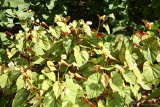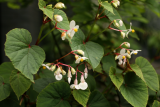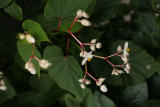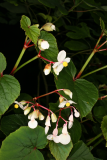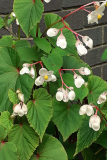Additional notes (click to expand)
Commemorative
Begonia: for Michel Bégon (1638-1710), French patron of botany, Governor-intendent of Saint-Domingue (Santo Domingo). He was a dedicated plant collecter and met Charles Plumier (who named the Begonia after him) in the Antilles. He entered naval administration around the age of 40 and first became treasurer of the marine du Levant at Toulon, then commissaire général de la marine at Brest and Le Havre, then intendant (Governor) of the îles du Vent (Windward Islands), and then intendant des galères at Marseille. His son, Michel Bégon de la Picardière (1667-1747) was Governor-intendent of New France (Canada) from 1712 to 1726. His other son, Claude-Michel Bégon de la Cour (1683-1748) served in the French military in Canada and became the Town Major of Quebec City and later the Governor of the city of Trois-Rivières (1742-1748). The genus Begonia in the Begoniaceae was published by Swedish botanist Carl Linnaeus in 1753. (CRC World Dictionary of Plant Names; Wikipedia)
http://www.calflora.net/southafrica/1A-B.html
Medicinal
The tuberous roots and fruits are anodyne, antiphlogistic and antispasmodic. Stimulates blood circulation.
https://pfaf.org/user/Plant.aspx?LatinName=Begonia+grandis
Nomenclature
Begonia grandis subsp. evansiana is a synonym
http://www.plantsoftheworldonline.org/
Geographical distribution
- Asia-Temperate, China, China South-Central
Begonia grandis Dryand. subsp. grandis
Family: BEGONIACEAEGenus: Begonia
Species: grandis Dryand.
SubSpecies: grandis
Common names: Beefsteak Plant; Hardy Begonia
Distribution summary: E Asia
Habit: Perennial
Hardiness: H4 - Hardy; average winter
Habitat: Woodlands
Garden status: Currently grown
Garden location: Horseshoe parterre by William Harvey house (G), Plants in pots (POT), Olive tree bed (O), Far East (L)
Flowering months: June, July, August, September, October
Reason for growing: Medicinal
.JPG)
.JPG)
